英 语 试 卷
1. 本试卷共9页,共五道大题,39道小题。满分60分。考试时间90分钟。
2. 在试卷和答题卡上认真填写学校名称、姓名和考号。
3. 试题答案一律填涂或书写在答题卡上,在试卷上作答无效。
4. 在答题卡上,选择题用2B铅笔作答,其它试题用黑色字迹签字笔作答。
5. 考试结束,将本试卷和答题卡一并交回。
第一部分
本部分共33题,共40分。在每题列出的四个选项中,选出最符合题目要求的一项。
一、单项填空(每题0.5分,共6分)
从下面各题所给的A、B、C、D四个选项中,选择可以填入空白处的最佳选项。
1. My aunt works as a doctor in a hospital. tries to save more people.
A. I B. He C. She D. You
2. Many people go to Tian’anmen Square National Day.
A. on B. to C. in D. at
3. — is the new airport from here?
— About one hour’s drive.
A. How much B. How far C. How old D. How often
4. Lucy play the violin very well and she has won many prizes.
A. can B. may C. need D. might
5. It was difficult to finish the task himself, the boy asked his friends for help.
A. so B. but C. or D. because
6. The English speech made me in speaking English than before.
A. confident B. more confident C. most confident D. the most confident
7. — Where is Harry, mum?
— He vegetables in the garden.
A. waters B. is watering C. will water D. has watered
8. All your efforts if you try your best to achieve your goal.
A. pay off B. paid off C. is paying off D. will pay off
9. The little girl much help since she came to the new school.
A. gets B. is getting C. has got D. will get
10. — What were you doing at eight yesterday evening, Peter?
— I my sister how to make paper cutting.
A. teach B. am teaching C. will teach D. was teaching
11. A new factory to deal with water pollution last month.
A. built B. builds C. was built D. is built
12. — Do you know ?
— Sure, next Friday afternoon.
A. when was the football match B. when will the football match be
C. when the football match was D. when the football match will be
二、完形填空(每题1分,共8分)
阅读下面的短文,掌握其大意,然后从短文后各题所给的A、B、C、D四个选项中,选择最佳选项。
A Bad Movie
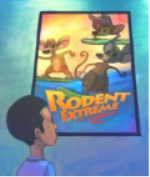
We all sat wide-eyed without daring to move, I tried to be brave and not to look away. Then the hero killed the beast( 怪 兽 ). With a terrible cry, the awful creature died and fell to the ground at the end of the 13 . We all cheered.
We’d all heard that the movie was a good movie, and we weren’t 14 . Today was special because Bobby showed up. Bobby was the coolest guy in our school and everybody liked him.
Then Derek asked us what we wanted to do after the movie. He told us it was the perfect timing to see another movie — Rodent Extreme and there was a showing just starting over in Theater Four. I checked the money in my pocket and 15 because I didn’t have enough money. Bobby laughed and said that we were already inside, so we could sneak into(溜进) Theater Four without paying. Although I wanted to see the movie very much, I was hesitated(犹豫的).
Bobby headed over to the theatre with Derek and my other friends. I didn’t want to be 16 out and I did want to see that movie. Bobby said he did this all the time, so it would be OK. I rejoined the group. Bobby showed us a good door to go through, so nobody would see us. I was enjoying the movie when I saw the beam( 光 线 ) of a flashlight 17 our theater. “Let me see your ticket,” the theater manager said. “I, uh, I lost it,” a voice said. The voice came from our friend Kenny who sat behind us. “Lost it? I don’t think so, you need to come with me,” the manager said.
Kenny followed the manager out of the theater. My skin felt hot all over. “He was so nailed( 逮 个
正着的). And the manager missed all of us!” Bobby said 18 . He sat up and looked around at us, as if he expected to be congratulated. I didn’t know what to do. Kenny was in big trouble. Should I leave? Or would I be in trouble, too? I felt terrible, but Bobby didn’t seem to 19 . After the movie, Bobby bragged(吹嘘) about how cool it was that Kenny got tossed out(扔出) and we didn’t. I didn’t think it was so cool. To tell the truth, I didn’t think Bobby was so cool anymore either. 20 the crowd is not always a good idea.
13. A. movieB. pictureC. songD. letter
14. A. relaxedB. upsetC. excitedD. disappointed
15. A. changedB. acceptedC. refusedD. smiled
16. A. workedB. leftC. lookedD. picked
17. A. searchingB. pointingC. cleaningD. finding
18. A. nervouslyB. happilyC. bravelyD. sadly
19. A. showB. believeC. careD. support
20. A. StayingB. LeadingC. LeavingD. Following
三、阅读理解(每题2分,共26分)
阅读下列短文,根据短文内容,从短文后各题所给的A、B、C、D四个选项中,选择最佳选项。
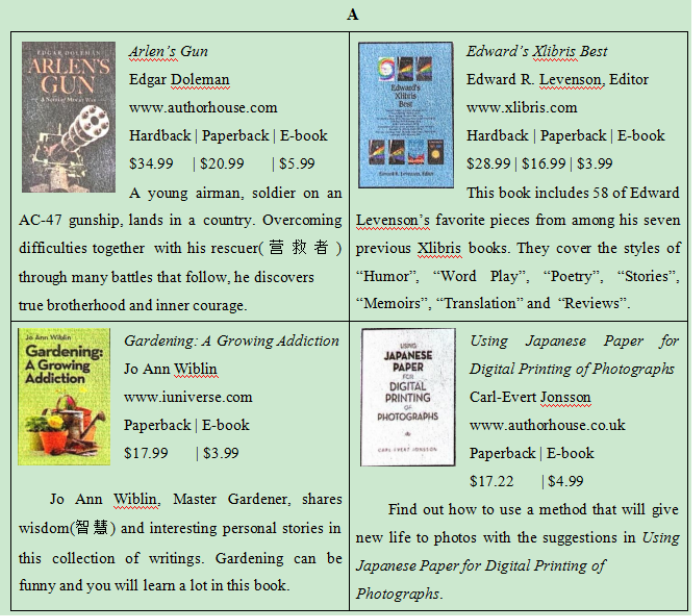
A. $34.99. B. $16.99. C. $28.99. D. $3.99.
22. Whose book will you read if you like gardening?
A. Jo Ann Wiblin’s. B. Edgar Doleman’s.
C. Carl-Evert Jonsson’s. D. Edward R. Levenson’s.
23. In Arlen’s Gun, what does the young man discover through the battles?
A. True brotherhood and inner courage. B. Ways to give new life to photos.
C. Wisdom and entertaining personal stories. D. Edward Levenson’s favorite pieces.
B
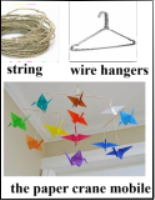
“Look! The community center is having an art contest,” said Grace. She was holding a flyer(传单).
Mrs. Simon read the flyer aloud. Everyone agreed they would like to enter the art contest. Mrs. Simon said, “Our classroom supply of art materials is low because it’s the end of the year. I’ll check with Mrs. Rice to see what she has.”
Mrs. Rice, the art teacher, didn’t have any art materials. “I won’t be getting a supply until next year,” she said. The whole class was upset. “How can we enter the art contest without art materials?” asked Grace.
“Maybe we can raise some money. We could have a bake sale,” suggested Hal. “I don’t think there’s time,” Mrs. Simon said.
“Let’s use the paper in the recycling bin,” Pablo said. Pablo did not often raise his hand. He rarely spoke up, so everyone was surprised when he offered an idea.
Hal said, “I’m curious about your idea. I want to learn why you would use old paper.”
“So we can save Earth’s resources,” replied Pablo. “When we use recycled paper, we use natural materials and save trees.”
“We can also use this old string and these wire hangers.” added Grace.
Now the class had to decide what to do with the materials. Pablo had another idea. “We can fold the paper into cranes. Then we can attach the cranes to a frame to make a mobile.”Mrs. Simon taught the children how to fold the paper into cranes. Then everyone helped attach the cranes to the mobile.
On the day of the art contest, the paper crane mobile hung in the large community center room. The huge space was crowded with art projects. From far off, the class spotted their project. The crane mobile swayed(摇摆) gently as people walked past. The paper cranes appeared to be softly flying.
The judges checked each art project. They looked closely at the crane mobile.
The paper crane mobile won the prize for the most creative use of materials. As the class proudly accepted their prize, they could not stop grinning (咧嘴笑). Grace exclaimed, “We made our art project, and we saved the Earth at the same time!”
24. How did the whole class feel when they knew they couldn’t get any art materials?
A. Happy. B. Surprised. C. Upset. D. Nervous.
25. What did they decide to do with the old materials they found?
A. To DIY wire hangers. B. To make paper cranes.
C. To raise some money. D. To build a center room.
26. According to the passage, their art project won the prize because they .
A. made the most wonderful work of art in class
B. decorated the center room with the paper cranes
C. worked as a team and solved the problems together
D. made good use of old materials and saved the Earth
C
The Spotlight Effect

Have you ever felt as if the whole world was watching while you made a mistake? Well, that is because of “the spotlight effect”. Here’s some good news
— it’s likely that no one even noticed.
The spotlight effect is a trick of the mind that makes us believe that people
notice us more often than they really do. We experience the spotlight effect not only when we make mistakes but also when we perform well. Every time we do something that is a little different from what we usually do, we may assume that everyone around us will notice. The spotlight effect might happen when we make a mistake in a game, have a bad hair day, or give a terrible answer in class. It can also appear when we score a big goal, ask someone on a date, or do a good deed. In these moments, it feels like everyone is watching.
The spotlight effect exists because we all get used to seeing things through our own eyes. Every person is the main character in his or her story, and the events of our lives seem to have great importance. We are so busy examining ourselves that we actually observe very little about everyone around us.
The spotlight effect is a very common part of the human experience. However, in some cases, it can lead to extreme social anxiety(焦虑) and nervousness around other people. Everyone suffers some degree of social anxiety. We all care about what others think, and we all want to be liked. It’s normal to wonder about what effect we have on other people. However, this can be a problem when the anxiety is too much to deal with. If someone is so nervous that they can’t make good decisions, then it’s time to take action and improve the situation.
Learning about the spotlight effect is important because it can help us reduce our anxiety. The next time you feel like everyone is staring at you, remind yourself that it’s just your mind playing tricks on you. Another good exercise is to make an effort to notice the people around you, rather than focusing on yourself. If you fill your mind with thoughts of your friends and family, it will help you be less self- conscious(难为情的).
27. The spotlight effect can make us believe that .
A. everyone suffers some degree of social anxiety
B. people notice us more often than they really do
C. no one actually noticed us while we made a mistake
D. we can do something that is little different from others
28. What do you know about the spotlight effect from the passage?
A. It makes everyone watch.
B. It makes people feel more confident.
C. It doesn’t happen when we perform well.
D. It makes people observe very little about others.
29. What is the last paragraph mainly about?
A. The reasons why we need to reduce our anxiety.
B. The importance of learning about the spotlight effect.
C. The suggestions on how to learn about the spotlight effect.
D. The ways to reduce our anxiety caused by the spotlight effect.
D
Have you ever played brain games? Do you know there is even a National Puzzle Day celebrated every year on January 29 in the United States? In addition to being entertaining and fun, puzzles have health and social benefits, especially in early childhood. Studies have shown that doing puzzles can help enhance(增强) brain activity in adults. It also improves creativity, concentration and memory.
You’ve probably seen ads for apps promising to make you smarter in just a few minutes a day. Hundreds of so-called “brain training” programs can be bought for downloading. These simple games are designed to challenge mental abilities, with the final goal of improving the performance of everyday tasks. But can these simple games really help you improve the way your brain functions?
Two large groups, scientists group and mental health practitioners(从业者) group, published some
statements on the effectiveness of these kinds of brain games. Both groups included people with years of research experience in cognition( 认 知 ), learning, skill acquisition, etc. Both groups carefully considered the same evidence available(可得的) at the time. Yet, they gave exactly opposite results.
One concluded that “there is little evidence that playing puzzle games improves cognitive abilities, or that it enables one to better deal with a complex field of everyday life.” The other argued that “a growing evidence shows that certain cognitive training can greatly improve cognitive function, including ways related to everyday life.”
In my opinion, although the brain training program seems an attracting shortcut, improving or maintaining cognition is not going to be quick and easy. Instead, it may require a lifetime — or at least an extended period — of cognitive challenge and learning.
If you’re worried about your cognition, what should you do? If you do play brain games, and you enjoy them, please continue to play. But don’t expect too much. If you’re playing only to gain cognitive
benefits, consider other activities instead, which might be cognitively exciting, or at least more satisfying and rewarding.
30. How did the two groups get their results?
A. By collecting data from research.
B. By considering available evidence.
C. By recording cognitive changes.
D. By comparing the differences.
31. The word “extended” in Paragraph 5 probably means “ ”.
A. early B. hard C. long D. same
32. What does the writer think of the effect of puzzle games on cognition?
A. It is not so valuable. B. It is very practical.
C. It is hardly acceptable. D. It is completely useless.
33. Which of the following would be the best title of the passage?
A. Can Brain Games be Improved?
B. Can Brain Games Make a Difference?
C. Can Cognitive Function be Trained?
D. Can Cognitive Function be Studied?
第二部分
本部分共6题,共20分。根据题目要求,完成相应任务。 四、阅读表达(每题2分,共10分)
Exams play an important role in education and sometimes it is also the source of stress for many students. So it is important for students to learn how to deal with stress caused by the exam . Here are some useful ways.
Before the exam
l Study in conditions similar to your test room.
There is a phenomenon in psychology(心理学现象) called context-dependent memory. It refers to the idea that we are best able to remember things in environments similar to when the information was encoded( 解码). If you are in a quiet room during your exam, try to simulate( 模拟) those conditions while you are preparing for it.
l Manage your time wisely.
Do not just cram(临时死记硬背) for an exam at the last minute, because this will surely lead to exam stress. Break up your study time into chunks over days, or weeks even. If possible, try to study at around the same time of day as you will be taking the test, because in this way you will be similarly tired or awake when you study and when you take your test. You will get used to how you feel when dealing with your course material on your test day.
l Take frequent breaks.
According to psychology studies, the average human brain can only focus on one task effectively for about 45 minutes. In addition, research in neuroscience( 神经科学) suggests that focusing on the same thing for too long weakens the brain’s ability to accurately process it.
During the exam
l Eat a proper exam day breakfast.
Without a proper breakfast your energy levels will quickly crash and may lead to stress and anxiety. Be sure to have a healthy, energy-packed breakfast on exam day. Try eating foods that provide long lasting energy, such as eggs or oats. Avoid foods that are high in sugar, which will give temporary energy but may cause you sleepy during the exam.
l Read instructions carefully.
Before answering any exam questions, figure out exactly what is expected of you. Skim the test to see its content and give yourself a rough(粗略的) idea of how long each question will take to complete. Ambiguity(不明确) can cause stress, so, by knowing how long the test is, you will reduce your stress.
l Avoid rushing.
Take your time going through the exam. If you get stuck in a question for a long time, instead of getting stressed about it, keep in mind that it is just one question on the exam. If possible, skip(跳过) that question and return to it at the end if you have time. Keep an eye on the clock and give yourself five to ten minutes to go over your answers to check for any mistakes or to guess on any questions that you initially skipped.
34. Why does the writer advise us to study at around the same time of day as we will be taking the test?
35. How long can human brain focus on one task effectively?
36. What kind of food should you have for breakfast on the exam day from the passage?
37. What should you do if you get stuck in a question for a long time from the passage?
38. What does the passage mainly talk about?
五、文段表达(10 分)
39. 从下面两个题目中任选一题,根据中文和英文提示, 完成一篇不少于 50 词的文段写作。文中已给出内容不计入总词数。所给提示词语仅供选用。请不要写出你的校名和姓名。
题目①
假设你是李华,你校英语组将举行中学生国际文化交流活动,现就“Chinese Traditional Festivals”这一主题向同学们征集素材,请你用英语写一篇推荐稿,推荐一个你最喜欢的中国传统节日,对其作简要介绍,并说明推荐理由。
提示词语: history, tradition, watch, recommend(推荐)
提示问题:
● What is your favorite Chinese traditional festival? Please describe it.
● Why do you want to recommend it?
I’m Li Hua, from Class 1, Grade 9.
![]()
![]()
题目②
社会实践活动(social practice activities)是学校有目的、有计划地组织学生走出校门, 了解社会、服务社会的教育方式。
某英文网站正在开展以“社会实践活动”为主题的征文活动。假如你是李华,请用英语写一篇短文投稿,介绍一次你们学校组织的你最喜欢的社会实践活动,你们做了什么,以及你有什么收获。
提示词语: share, celebrate, visit, knowledge
提示问题: ● Which social practice is your favorite?
● What did you do during the activity?
● What have you learned from the activity?
At my school we have a lot of social practice activities.
![]()
![]()

南昌市心远中学中考英语模拟试题及答案

2023河南省实验中学中考英语模拟试题

2023新乡市第一中学中考英语模拟试题

2023常州市第二十四中学中考英语模拟试题

2023济南外国语学校中考英语模拟试题
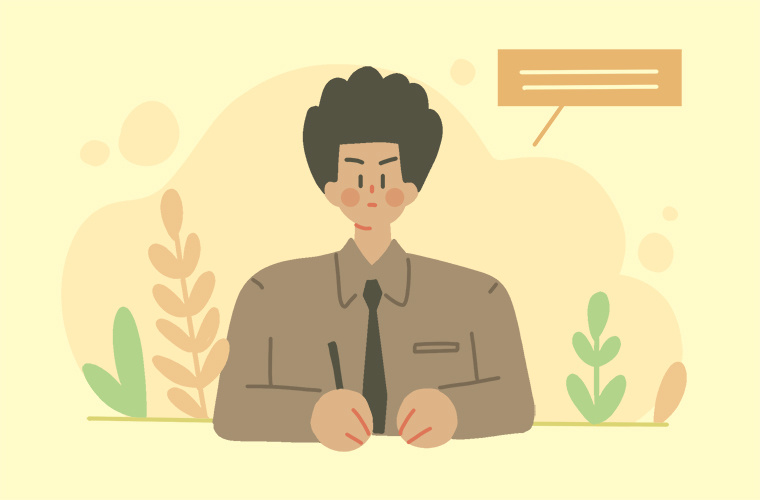
在同一平面内到定点的距离等于定长的点的集合叫做圆。这个定点叫做圆的圆心。圆形一周的长度,就是圆的周长。能够重合的两个圆叫等圆,等圆有无数条对...

sin45度等于根号2分之2。可以以用勾股定理来求这个正弦值,设一个直角三角形中有一锐角为45度,则另一角为45度。设一条直角边为X,则根据...
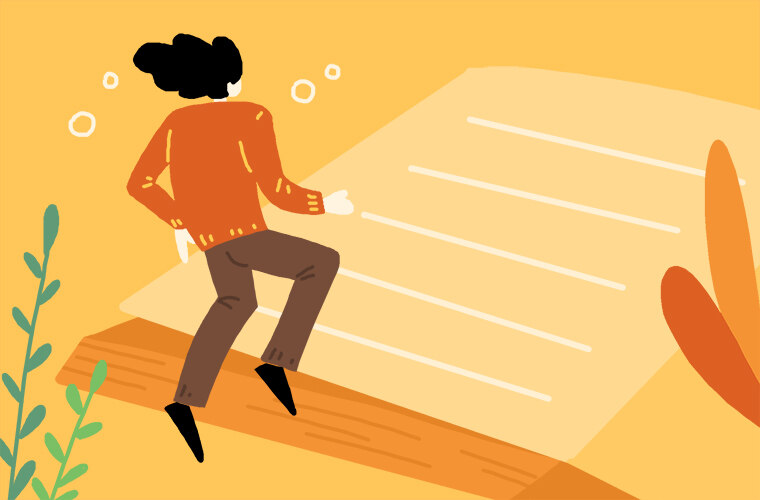
宋朝司马光出生于官宦世家。从小机智过人,勤奋好学。刚满二十岁即考上进士。他为官清廉,公务之余常利用时间读书,立志写一部通志,作为人们的借鉴。...